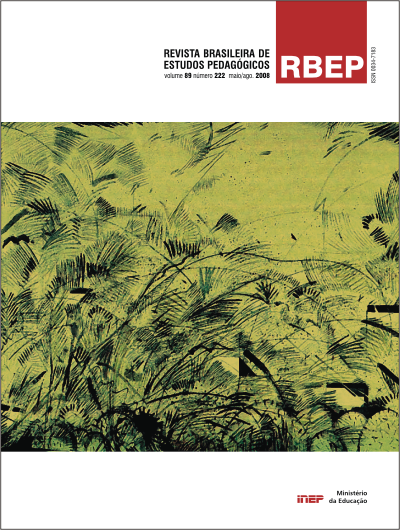A pedagogia política de Rousseau
Resumo
O trabalho tem dois eixos articulados entre si: primeiro, apresenta Emílio e Do Contrato Social como obras pedagógicas de Rousseau; em seguida, mostra a utilização que o autor faz dos conceitos experiência, liberdade e vontade geral, enquanto categorias que dão sustentação a esta pedagogia política. Na primeira linha de reflexão, afirma-se que o próprio fato do Contrato Social estar contido no Emílio indica a vontade instrutora do autor de ensinar as regras básicas para que o cidadão insira-se na sociedade. O Contrato Social visa instruir: Rousseau instrui-se através dele, instrui também Emílio e todo cidadão. A questão pedagógica por excelência é a explicitação da natureza do poder político. No segundo eixo temático, afirma-se que há em Rousseau uma intencionalidade educativa onde a relação entre liberdade e autoridade é uma das tensões que ocorre. Da concepção de natureza humana exposta em sua exterioridade, Rousseau extrai o critério de construção do essencial no humano, o que tem valor permanente e substantivo, que é necessário. Nesta perspectiva de formação e educação há um elemento que se destaca, sem o qual o homem perde a dimensão que o distingue: a liberdade, não ilimitada, mas regulada pela necessidade, pela autoridade da vontade geral. Palavras-chave: Rousseau; pedagogia política; liberdade; necessidade; vontade geral Abstract The paper encompasses two paths of argumentation. First, it brings forward both Rousseau’s Emile and The Social Contract as educational works; next, it shows the way the author makes use of concepts such as experience, freedom and general will as categories that provide support to his political pedagogy. In the first argumentative path, it is stated that the very fact that The Social Contract is contained inside Emile indicates the author’s will of teaching the basic rules for a citizen to join society. The Social Contract aims at instructing: through it, Rousseau instructs himself, as well as he instructs Emile, and every citizen. The pedagogical question by excellence is the explanation of the political power. In the second argumentative path, it is stated that there is in Rousseau an educational intentionality in which takes place a tension between freedom and authority. Rousseau brings out from the concept of human nature the criterion for the construction of what is essential in human beings, of what has lasting and substantial worth, of what is necessary. In such a perspective of formation and education, it is freedom that is uplifted, and without it, man loses what makes him different from other beings. But it is not unlimited freedom that distinguishes man; instead, it is freedom ruled by necessity, in other words, by the authority of general will. Keywords: Rousseau; political pedagogy; freedom; necessity; general willDownloads
Não há dados estatísticos.
Publicado
30-10-2008
Como Citar
OLIVEIRA, N.; GHIGGI, G.; OLIVEIRA, A. DA R. A pedagogia política de Rousseau. Revista Brasileira de Estudos Pedagógicos, v. 89, n. 222, 30 out. 2008.
Edição
Seção
Estudos
A aceitação do artigo implica automaticamente a cessão de seus direitos autorais ao Instituto Nacional de Estudos e Pesquisas Educacionais Anísio Teixeira (Inep).
A Revista Brasileira de Estudos Pedagógicos adota, desde 2016, a licença CC-BY.
A reprodução total ou parcial dos artigos da Revista é permitida desde que citada a fonte de publicação original e o link para a licença CC BY 4.0 e que sejam indicadas eventuais alterações no texto.




















